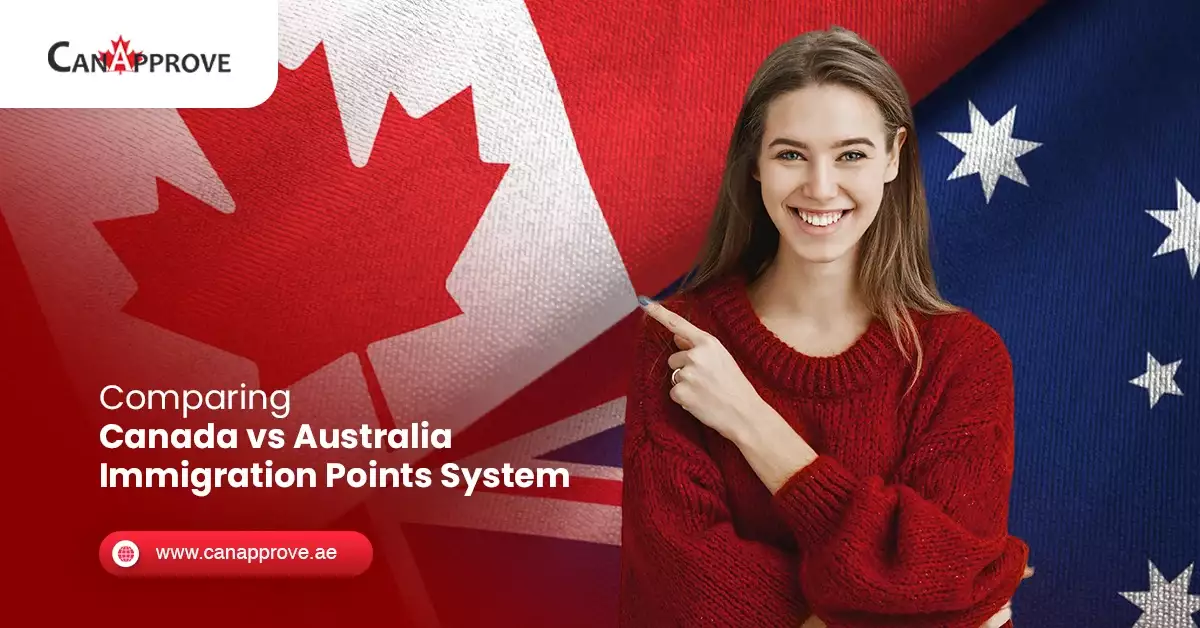If you are thinking to migrate abroad for better career options and improved living standards, chances are high that Canada and Australia are already on your priority list. The world’s major immigration destinations – Canada and Australia – use a merit-based points system to determine whether or not a candidate is eligible to apply for immigration. Here we are comparing Canada vs Australia immigration points system for you to make an informed decision.
Immigration in a literal sense means obtaining a permanent residency visa in the country of choice. The points awarded in such an immigration system will take into account a variety of core human capital factors such as
- Age,
- Work Experience,
- Language Proficiency,
- Education, and
- Spouse/Partner skill set.
The higher the number of points, the more likely you will qualify to migrate abroad to Canada or Australia!
Quick Comparison Between Canada vs Australia Immigration Points System
If you observe closely, both these countries exhibit a very different approach to allowing immigrants or granting permanent residency to eligible skilled workers.
Canada’s given immigration points system corresponds to the Federal Skilled Worker Program, which happens to be the most popular program among foreign skilled workers for permanent residency.
If you score 67 points or higher, you may qualify for the Federal Skilled Worker Program. If you meet the other requirements too, you can submit a profile to the Express Entry pool. Once you’re in the Express Entry pool, your profile will be evaluated and ranked based on a different system called Comprehensive Ranking System (CRS).
If you’re interested in Australian permanent residency, four visa subclasses evaluate your eligibility. You must score 65 points or higher to qualify under two direct pathways for Australian PR (Subclass 189, Subclass 190) or two provincial pathways (Subclass 491, Subclass 188).
Some minor details may have been overlooked here for sake of uniformity. Contact our immigration consultants now for a full update on Canada vs Australia immigration points system based on your profile.
-
Applicant Age Criterion
| Canada Immigration Points System | Australia Immigration Points System | ||
| Age Group | Points | Age Group | Points |
| 18-35 years | 12 | 18-24 years & 33-39 years | 25 |
| 36-40 years | 11-7 | 25-32 years | 30 |
| 41-46 years | 6-1 | 40-44 years | 15 |
| 47 years & above | 0 | 45 years & above | 0 |
In terms of age criteria, Canada awards maximum points to the younger population over 18 years who would typically pursue higher education before gaining work experience in related occupations and On the other hand Australia prefers candidates who are in their prime working age (25-32 years) to qualify for permanent residency.
-
Applicant Work Experience Criterion
| Canada Immigration Points System | Australia Immigration Points System | ||
| Work Experience | Points | Work Experience | Points |
| 1 year | 09 | 1-3 years (outside Australia) | 0 |
| 2-3 years | 11 | 3-4 years (outside Australia) | 05 |
| 4-5 years | 13 | 5-7 years (outside Australia) | 10 |
| 6+ years | 15 | 8+ years (outside Australia) | 15 |
Australia is biased in awarding points based on work experience.
Australia awards maximum points to eligible skilled workers who have had work experience inside Australia. For example,
- 3-4 (experience in Australia): 10 points
- 5-7 (experience in Australia): 15 points
- 8+ (experience in Australia): 20 points
On the other hand, Canada remains neutral and prefers any candidates with work experience outside or inside Canada.
Australia considers eligible candidates with more than 3 years of work experience as against Canada which considers skilled workers for immigration with just over 1 year of work experience.
-
Language Proficiency Criterion
| Canada Immigration Points System | Australia Immigration Points System | ||
| English Proficiency | Points | English Proficiency | Points |
| CLB 9 or higher | 24 | Competent English | 0 |
| CLB 8 | 20 | Proficient English | 10 |
| CLB 7 | 15 | Superior English | 20 |
The distinguishing factor here is Canada has two official languages: English and French, whereas Australia considers English as its official language. Therefore, interested candidates have to qualify for language proficiency according to the requirements of the permanent residency program.
CLB stands for Canadian Language Benchmark (CLB) and is equivalent to the standard proficiency test available for English and French. Those who show proficiency in French are given an additional 4 points along with their band score in CLB.
-
Applicant Education Criterion
| Canada Immigration Points System | Australia Immigration Points System | ||
| Education | Points | Education | Points |
| Degree/Diploma | 19 | Degree/Diploma | 10 |
| Bachelor’s Degree | 21 | Bachelor’s Degree | 15 |
| Doctorate | 25 | Doctorate | 20 |
Canada is more liberal in awarding assessment points based on the applicant’s educational qualification. This is more because Canada allows for direct immigration of eligible candidates even without study or work experience in any of the Canadian provinces or territories.
Further, Canada awards assessment points for additional categories like
- HS or SC Diploma: 5 points
- College Certificate: 15 points
- BS/MBA/Master’s: 23 points
Both the countries favor retaining international students after graduation. While Canada awards Post-Graduation Work Permit (PGWP) for 3 years, Australia offers a flexible work visa for graduating students. These visa holders gain work experience inside the country and may be eligible to qualify for permanent residency after a certain period.
Final Verdict: Canada vs Australia Immigration Points System
When it comes to Skills of Partner/Spouse, Canada awards a maximum of 5 points whereas Australia awards a maximum of 10 points. However, it will be premature to conclude that Canada does not favor family immigration.
Canada is pursuing the most ambitious immigration plan in its history to welcome over 1.7 million new permanent residents in the next three years. Over 60 percent of the target is said to be economic-class immigration programs and whereas about 20 percent would be fulfilled from the family-class programs.
Earlier in April 2022, the Morrison Government called for increasing permanent skilled migration numbers. The cause to increase immigration to Australia post-pandemic is reflected well in Australia’s federal budget for 2022-23. The Australian government has fixed the 2022-23 permanent migration program ceiling at 160,000 places.
While both the countries are poised well to welcome more skilled immigrants to boost post-pandemic recovery, you have to book a free appointment with CanApprove and consult an expert before making a decision.
CanApprove is a certified consultant for Canada and Australia immigration services and overseas education counseling. With a rich experience of 20+ years in the industry, CanApprove has had major successes in fulfilling the dreams of thousands of migrating abroad!














Fazalahmad says:
I like because there humans recoserse and have good business